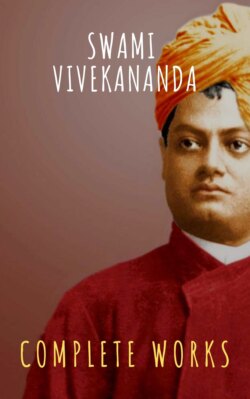Читать книгу Complete Works of Swami Vivekananda - Swami Vivekananda - Страница 106
На сайте Литреса книга снята с продажи.
An Evening With Our Hindu Cousins
Оглавление(Northampton Daily Herald, April 16, 1894)
For Swami Vive Kananda proved conclusively that all our neighbors across the water, even the remotest, are our close cousins differing only a trifle in color, language, customs and religion, the silver-tongued Hindu monk prefacing his address in city hall Saturday evening [April 14] by an historic sketch of the origin of his own and all other leading nations of the earth which demonstrated the truth that race-kinship is more of a simple fact than many know or always care to admit.
The informal address that followed regarding some of the customs of the Hindu people was more of the nature of a pleasant parlor talk, expressed with the easy freedom of the conversational adept, and to those of his hearers possessing a natural and cultivated interest in the subject both the man and his thought were intensely interesting for more reasons than can be given here. But to others the speaker was disappointing in not covering a larger scope in his word-pictures, the address, although extremely lengthy for the American lecture-platform, referring to very few of the “customs and manners” of the peculiar people considered, and of whose personal, civil, home, social and religious life much more would have been gladly heard from this one of the finest representatives of this oldest of races, which the average student of human nature should find preeminently interesting but really knows the least about.
The allusions to the life of the Hindu began with a picture of the birth of the Hindu boy, his introduction to educational training, his marriage, slight reference to the home life but not what was expected, the speaker diverging frequently to make comparative comments on the customs and ideas of his own and English-speaking races, socially, morally and religiously, the inference in all cases being clearly in favor of his own, although most courteously, kindly and gracefully expressed. Some of his auditors who are tolerably well posted as to social and family conditions among the Hindoos of all classes would have liked to have asked the speaker a challenging question or two on a good many of the points he touched upon. For instance, when he so eloquently and beautifully portrayed the Hindu idea of womanhood as the divine motherhood ideal, to be forever reverenced, even worshipped with a devotion of loyalty such as the most woman-respecting unselfish and truest of American sons, husbands and fathers cannot even conceive of, one would have liked to know what the reply would have been to the query as to how far this beautiful theory is exemplified in practice in the majority of Hindu homes. which hold wives, mothers, daughters and sisters.
The rebuke to the greed for gain, the national vice of luxury-seeking, self-seeking the “dollar-caste” sentiment which taints the dominant white European and American races to their mortal danger, morally and civilly, was only too just and superbly well-put, the slow, soft, quiets unimpassioned musical voice embodying its thought with all the power and fire of the most vehement physical utterance, and went straight to the mark like the “Thou art the man” of the prophet. But when this learned Hindu nobleman by birth, nature and culture attempts to prove — as he repeatedly did in his frequent and apparently half-unconscious digressions from the special point under consideration — that the distinctively self-centred, self-cultivating, preeminently self-soulsaving, negative and passive, not to say selfishly indolent religion of his race has proven itself superior in its usefulness to the world to the vitally aggressive, self-forgetful, do-good unto-others-first-last-and-always, go-ye-into-all-the-world and work religion which we call Christianity, in whose name nine tenths of all the really practical moral, spiritual and philanthropic work of the world has been and is being done, whatever sad and gross mistakes have been made by its unwise zealots, he attempts a large contract.
But to see and hear Swami Vive Kananda is an opportunity which no intelligent fair-minded American ought to miss if one cares to see a shining light of the very finest product of the mental, moral and spiritual culture of a race which reckons its age by thousands where we count ours by hundreds and is richly worth the study of every mind.
Sunday afternoon [April 15] the distinguished Hindu spoke to the students of Smith college at the vesper service, the Fatherhood of God and the Brotherhood of man being, virtually, his theme, and that the address made a deep impression is evinced by the report of every auditor, the broadest liberality of true religious sentiment and precept characterizing the whole trend of thought.
